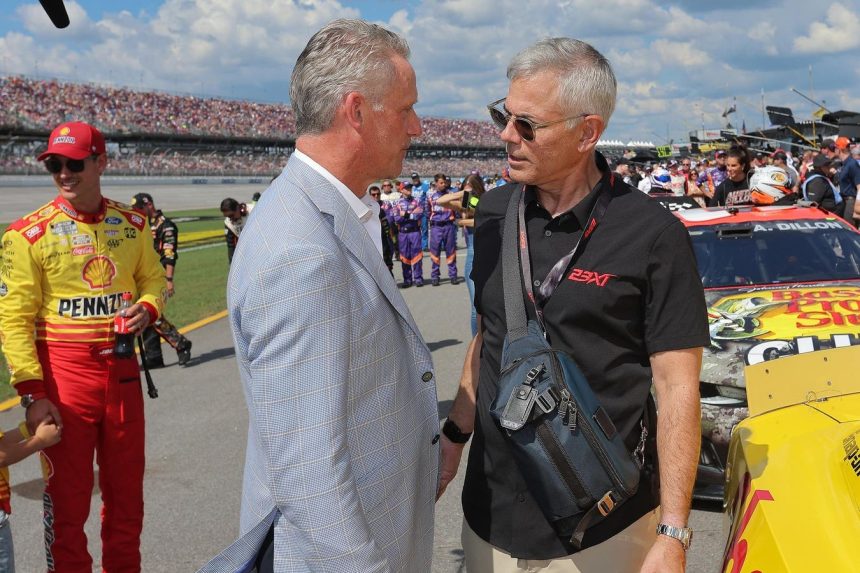The high-octane world of NASCAR has found itself embroiled in a legal battle as intricate and dramatic as a nail-biting race to the finish line. 23XI Racing and Front Row Motorsports, two prominent teams within the NASCAR ecosystem, have locked horns with the sport’s governing body in a dispute centered around the highly valued charters – the keys to guaranteed participation in the NASCAR Cup Series. This legal standoff, marked by escalating tensions and strategic maneuvers, has captivated the racing world and raised fundamental questions about the balance of power within the sport.
At the heart of this conflict lie the charter agreements, documents that essentially grant teams a guaranteed spot in each NASCAR Cup race. While seemingly straightforward in concept, these agreements have become a source of contention between the teams and NASCAR. 23XI Racing and Front Row Motorsports, after two years of intense negotiations, have refused to sign the 2025 Charter Agreement, alleging that NASCAR has engaged in anticompetitive practices designed to restrict teams’ autonomy and financial prospects. This refusal ignited a legal firestorm, with the teams launching an antitrust lawsuit against NASCAR, claiming the governing body wields excessive control over the sport, stifling competition and innovation.
NASCAR responded swiftly and forcefully to the teams’ legal challenge. In a sharply worded communication, NASCAR President Steve Phelps essentially dared the teams to race without charters, highlighting the precarious position they would find themselves in without the guaranteed entry and financial stability that charters provide. This thinly veiled threat underscored the significant leverage NASCAR holds over its teams, prompting 23XI Racing and Front Row Motorsports to seek a court injunction to protect their participation rights while the legal proceedings unfolded.
The initial attempt to secure an injunction proved unsuccessful. However, in a dramatic turn of events, the teams secured a partial victory. A court overturned the previous decision, granting a limited preliminary injunction that allows 23XI Racing and Front Row Motorsports to field two cars in each 2025 NASCAR Cup Series race, effectively maintaining their current level of participation. Crucially, this injunction also carves out an exception regarding the “release” clause typically included in charter agreements. This clause, which would normally prevent teams from pursuing antitrust litigation against NASCAR, has been rendered inapplicable in this specific case, allowing the ongoing antitrust lawsuit to proceed unimpeded.
This legal victory represents a significant blow to NASCAR’s initial strategy. The court not only affirmed the teams’ right to participate in the 2025 season but also effectively blocked NASCAR from using a contractual technicality to dismiss the antitrust lawsuit. Moreover, the ruling mandated that NASCAR could not impede the teams from acquiring two charters from Stewart-Haas Racing, further solidifying their competitive standing for the upcoming season. This acquisition is crucial for the teams, as the absence of charters would jeopardize their ability to secure sponsorships and retain top-tier drivers, potentially threatening their very existence within the sport.
The ramifications of this ongoing legal battle are far-reaching. Without charters, 23XI Racing and Front Row Motorsports face an uncertain future. Reports indicate that at least one major sponsor had expressed reservations about continuing their relationship with a team lacking a charter, putting significant financial pressure on the teams. Furthermore, the career of star driver Tyler Reddick, currently with 23XI Racing, hung in the balance, as his contractual obligations were contingent on the team’s secured participation in the series. The court’s decision offers a temporary reprieve, allowing the teams to compete while the legal battle continues, but the ultimate outcome remains uncertain.
The legal saga is far from over. NASCAR retains the right to appeal the court’s decision, potentially reversing the current favorable outcome for the teams. This sets the stage for a prolonged legal contest, with each side maneuvering for an advantageous position. The court has established a timeline to ensure the antitrust claims are resolved before the start of the 2026 season, creating a deadline for either a settlement or a final judicial resolution. However, given the current acrimonious relationship between the parties, the prospect of a settlement appears remote. The future of NASCAR’s charter system and the balance of power within the sport hang in the balance, making this ongoing legal battle one of the most consequential in NASCAR history.



